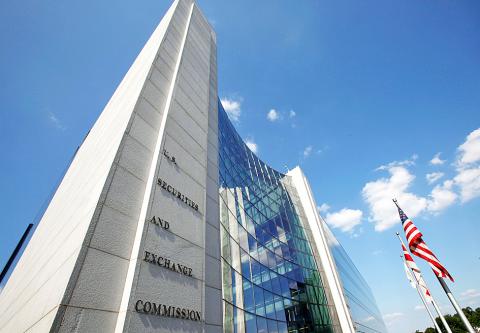The US Securities and Exchange Commission (SEC) waited until Wednesday to disclose a hack of its corporate filing system that occurred last year, raising questions about the agency’s ability to protect important financial information and comes as Americans are still weighing the consequences of the massive hack at Equifax Inc.
While the SEC discovered the breach to its corporate filing system last year, the agency said it only became aware last month that information obtained by the intruders might have been used for illegal trading profits.
Experts question the length of time taken to disclose the breach and why the SEC is not meeting the same security standards it demands of corporate America.

Photo: Reuters
“It took quite a while,” said Robert Cattanach, an attorney at Dorsey & Whitney and former trial attorney for the US Department of Justice, whose work includes cybersecurity and data breaches. “The integrity of our whole trading system is dependent on keeping this information secure... People have got some ‘splaining to do.”
The SEC did not explain why the initial hack was not revealed sooner, or which individuals or companies may have been affected. The disclosure came two months after a government watchdog said deficiencies in the corporate filing system put the system, and the information it contains, at risk.
The SEC also did not disclose any information about who might have carried out the breach. A hack by Chinese or Russian actors cannot be ruled out, experts say.
“Certainly state actors would be on the list of suspects that come to mind,” said Marcus Christian, a former federal prosecutor who is an attorney working in Mayer Brown’s cybersecurity and national security practices.
Still, the list would also include “regular old criminal actors,” Christian added.
SEC Chairman Jay Clayton disclosed the hack in a statement posted to the agency’s Web site. It came just two weeks after the credit agency Equifax revealed a stunning cyberattack that exposed highly sensitive personal information of 143 million people.
Clayton is to appear on Tuesday before the US Senate Banking Committee, and he is certain to be questioned about the hack.
US Senator and committee member Mark Warner said in a statement on Thursday that the disclosures by the SEC and Equifax show “that government and businesses need to step up their efforts to protect our most sensitive personal and commercial information.”
Clayton blamed the breach on “a software vulnerability” in the filing system known as EDGAR —Electronic Data Gathering, Analysis and Retrieval system.
EDGAR processes more than 1.7 million electronic filings a year. Those documents can cause enormous movements in the stock market, sending billions of US dollars into motion in fractions of a second.
The hack of EDGAR is especially concerning because of how widely investors have used and trusted the system, which first came online in the early 1990s.
Companies periodically file earnings and a range of financial information, and they alert investors to important developments that could affect their share prices, like government investigations, executive shake-ups and approaches for a takeover.

GROWING OWINGS: While Luxembourg and China swapped the top three spots, the US continued to be the largest exposure for Taiwan for the 41st consecutive quarter The US remained the largest debtor nation to Taiwan’s banking sector for the 41st consecutive quarter at the end of September, after local banks’ exposure to the US market rose more than 2 percent from three months earlier, the central bank said. Exposure to the US increased to US$198.896 billion, up US$4.026 billion, or 2.07 percent, from US$194.87 billion in the previous quarter, data released by the central bank showed on Friday. Of the increase, about US$1.4 billion came from banks’ investments in securitized products and interbank loans in the US, while another US$2.6 billion stemmed from trust assets, including mutual funds,

Micron Memory Taiwan Co (台灣美光), a subsidiary of US memorychip maker Micron Technology Inc, has been granted a NT$4.7 billion (US$149.5 million) subsidy under the Ministry of Economic Affairs A+ Corporate Innovation and R&D Enhancement program, the ministry said yesterday. The US memorychip maker’s program aims to back the development of high-performance and high-bandwidth memory chips with a total budget of NT$11.75 billion, the ministry said. Aside from the government funding, Micron is to inject the remaining investment of NT$7.06 billion as the company applied to participate the government’s Global Innovation Partnership Program to deepen technology cooperation, a ministry official told the

Taiwan Semiconductor Manufacturing Co (TSMC, 台積電), the world’s leading advanced chipmaker, officially began volume production of its 2-nanometer chips in the fourth quarter of this year, according to a recent update on the company’s Web site. The low-key announcement confirms that TSMC, the go-to chipmaker for artificial intelligence (AI) hardware providers Nvidia Corp and iPhone maker Apple Inc, met its original roadmap for the next-generation technology. Production is currently centered at Fab 22 in Kaohsiung, utilizing the company’s first-generation nanosheet transistor technology. The new architecture achieves “full-node strides in performance and power consumption,” TSMC said. The company described the 2nm process as

JOINT EFFORTS: MediaTek would partner with Denso to develop custom chips to support the car-part specialist company’s driver-assist systems in an expanding market MediaTek Inc (聯發科), the world’s largest mobile phone chip designer, yesterday said it is working closely with Japan’s Denso Corp to build a custom automotive system-on-chip (SoC) solution tailored for advanced driver-assistance systems and cockpit systems, adding another customer to its new application-specific IC (ASIC) business. This effort merges Denso’s automotive-grade safety expertise and deep vehicle integration with MediaTek’s technologies cultivated through the development of Media- Tek’s Dimensity AX, leveraging efficient, high-performance SoCs and artificial intelligence (AI) capabilities to offer a scalable, production-ready platform for next-generation driver assistance, the company said in a statement yesterday. “Through this collaboration, we are bringing two